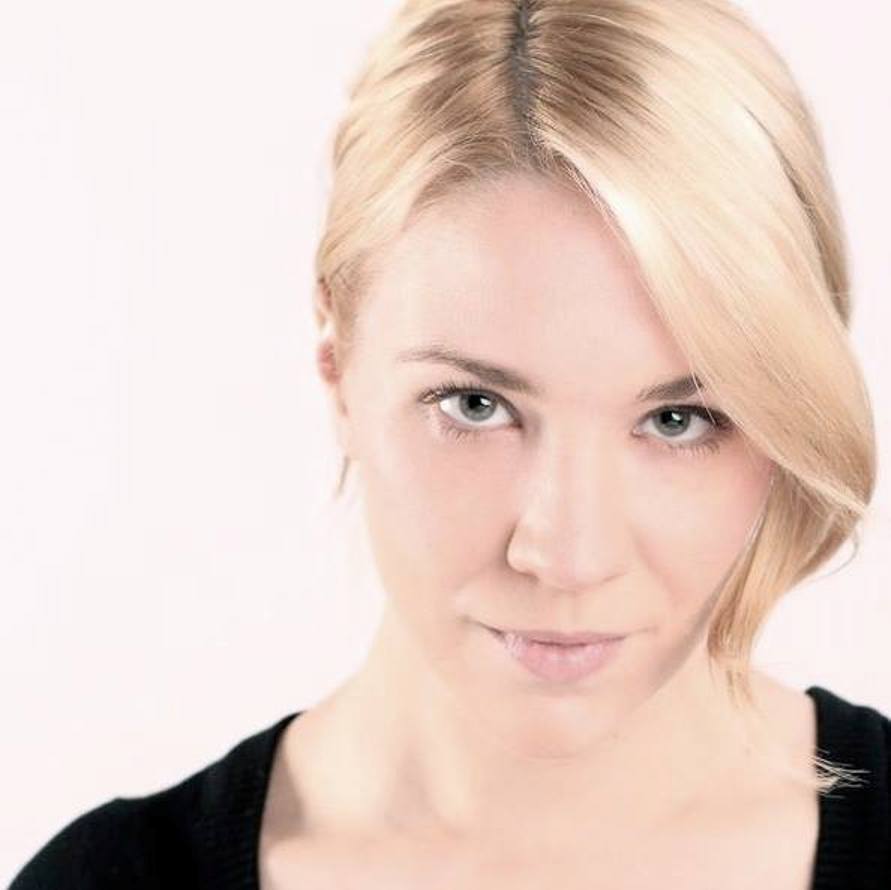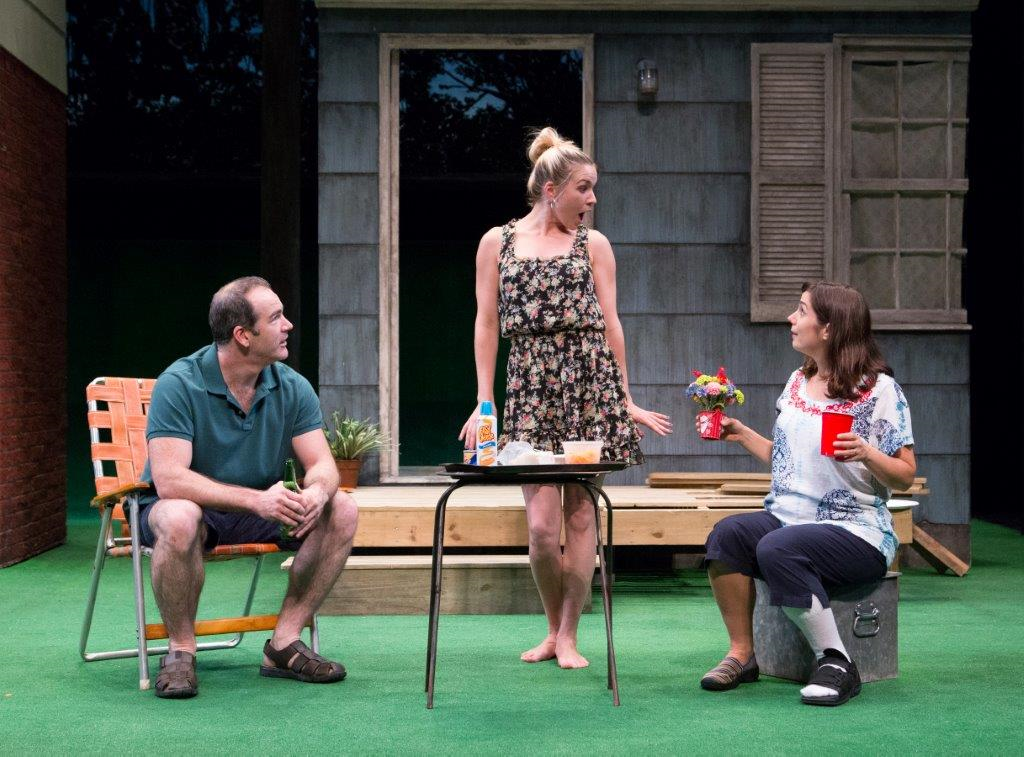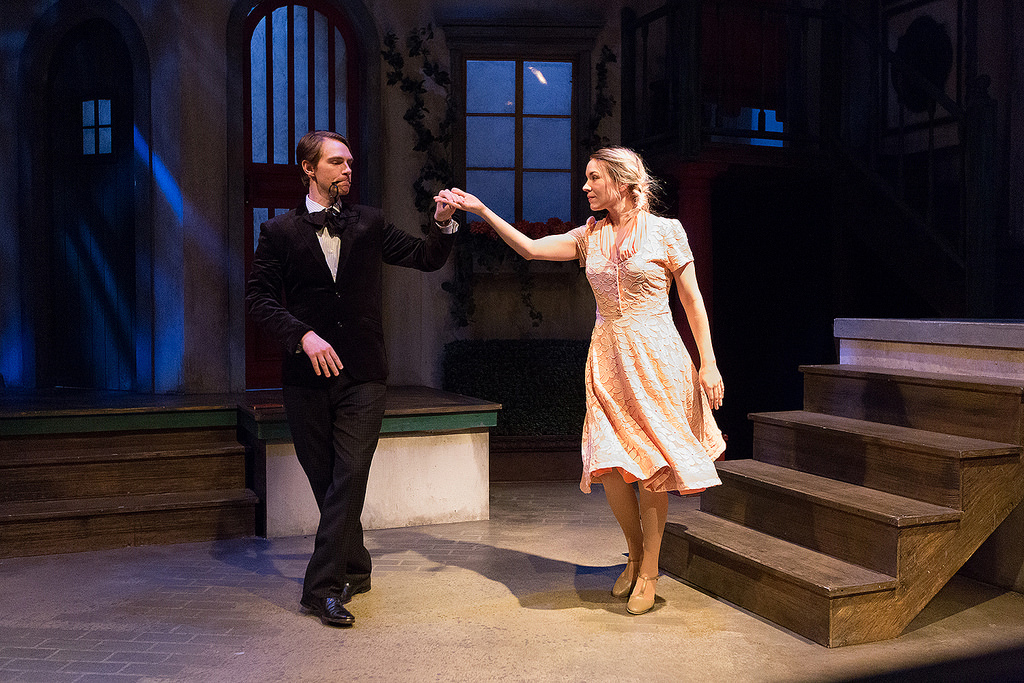Acting, choreography, awards judging, teaching, yoga—K.O. DelMarcelle does it all, and 2015 was a big year all around for K.O. Nominated for two Barrymore Awards for an Actress in a Supporting Role (as Sharon in DETROIT at the Philadelphia Theatre Company and Bianca in THE TAMING OF THE SHREW at the Lantern–after having already received a nomination for Outstanding Movement and Choreography in 2014 for her work on the Lantern’s EMMA), she made the decision to return to school this past September to pursue her second Master’s degree, in Acting, at Temple University (the first was in Theater, from Villanova), just as her career was reaching new heights.
While on the run between the classes she is taking and instructing (K.O. adjuncts at West Chester University and Community College of Philadelphia, and has been working with Dancing with the Students since 2007) and rehearsals for Temple’s THE TWO GENTLEMEN OF VERONA, in which she is acting, and Simpatico Theatre Project’s THE IT GIRL (an original work by Amanda Schoonover, Brenna Geffers, and Anthony Crosby), for which she serves as dance consultant, she found time to talk to Phindie about her past experiences, current life, and future aspirations.
 PHINDIE: After having such a successful year in the theater, why did you decide to take a break from your career and go back to school?
PHINDIE: After having such a successful year in the theater, why did you decide to take a break from your career and go back to school?
K.O. DELMARCELLE: I think I’m not taking a break from my career, I’m expanding upon it, so that by the time I finish my terminal degree, my options will be through the roof. At Temple we’re required to appear in two shows each academic year—one per semester—and I’m also able to take on some outside professional projects, plus our summers are free. The university pays us, we get college-level teaching experience, and I’m getting to work with director Jim Christy in this semester’s production. It’s all an honor, and a great way to build my CV!
PHINDIE: What new skills/approaches/information are you learning that you didn’t already know?
KOD: One of the major reasons I went to Temple is because of the Fitzmaurice Voicework masters; the vocal training is outstanding, with four voice/body specialists on the faculty, so I’m getting a lot of technique I didn’t have before—especially breath control. We’re also required to take a course in teaching higher education, so I learned to evaluate myself and my psyllabus, not just to approach teaching intuitively. It’s been very useful to have that kind of structured approach and objective self-appraisal.
PHINDIE: What are the anticipated benefits of having multiple graduate degrees?How important is it to be trained in a variety of specializations in the theater, and to have versatility in several areas of your chosen discipline?
KOD: It gets me into the room, and that’s where I want to be!I’ll be able to walk into any university and say, “I can teach whatever you want me to do, I’ve got it covered.” Between my M.A. in Theater and M.F.A. in Acting, I can teach the history for non-majors and the practice for majors; it increases a person’s marketability to be well-rounded in both aspects. At the end of the day, as a freelancer, you have to have a plan for survival. I went to Villanova for what I thought would be a terminal degree, and all the dramaturgical work I did there helped make me a better actor and choreographer, having studied the history. They always say at Villanova that they turn out “Smartists.” I definitely think it’s smart for the future to cultivate that versatility and employability.

PHINDIE: What do you love most about each of the fields in which you are active?
KOD: The common denominator of all of them is the sense of community and collaboration. In the theater, we all work together to create a production, we can’t do it alone; the actors need the director and the designers, all working together towards a common goal, to create a successful show. I like being around people who want to do big things, to talk about big ideas, and I get that from all of the work I do. It’s the same in the classroom, where people come together to learn with, and from, each other, to discuss and to achieve. In yoga, we all come together in the studio to breathe and to meditate. That is one of my default modes, when I’m feeling a little overwhelmed by all my freelance work. I haven’t let anxiety take over my life because there is that space and time when meditation is needed to balance the chaos of the busy lives we live. I always remind myself that I need to be present, and to breathe, so the practice of yoga has been extremely helpful with that.
PHINDIE: You received your undergraduate degree from Montclair State University in northern New Jersey, in the New York metropolitan area.Why did you decide to make Philadelphia your home base?
KOD: Rob McClure was a classmate in the B.A. program at Montclair State. He kept leaving school, at one point he even dropped out of the semester, because he was getting cast in Philadelphia. I asked him about it, and he said “Philly is where it’s happening! You can work, you can live, you can get a home.” From his work in Philadelphia, he’s gone on to Broadway, but he started here and continues to work here and elsewhere. I thought that was good advice, so it’s because of Rob that I decided to come to Philadelphia. I applied to Villanova for my Master’s; I was called to audition and was accepted into the program, and then settled here. Like Rob, I would like to expand—not to leave, but to work outside of Philadelphia, to explore other places—but still keep my toes in the Philly pond.
PHINDIE: As a past Barrymore voter and nominator, current judge, and multiple nominee, what is the importance of having awards to recognize excellence in theater in Philadelphia?
KOD: It’s very important to me. I’ve been doing it since I graduated from Villanova, because I think it’s valuable to have your peers evaluate you; it raises the bar, to be as good as you can be, and it raises the stakes, to be recognized for your work. It’s also fun to come together once a year for the ‘theater prom’ and to celebrate the season in a positive way, appreciating and congratulating each other, nominated or not. I’m so proud of my colleagues, and that’s one of the things I love most about the Philadelphia theater community: you can live here and work here and be friends with your fellow artists and celebrate each other. It’s really special; I don’t know if it’s like that in other places. I’ve been here since 2007, and that seems like a long time on paper, but it’s really not. Yet in that time, I’ve met some extraordinary people, and I’m so grateful for the creative and inspiring women I work with, who have become my closest friends, who have been so supportive when I needed them the most. It’s important to have female friends who understand; they become your family. The Philadelphia theater community has given me that, and it deserves to be celebrated.

PHINDIE: There has been a lot of talk in recent years about the scarcity of good roles for women, and the trouble women face in being taken seriously, being judged more for their looks or their connections/associations, rather than their talent. Have you encountered any personal difficulties or perceived discrimination as a woman in the theater?
KOD: Yes.I think even in 2016, just based on numbers alone, that there aren’t as many parts available. The 30-something female is not as in demand as the male of any age, and that doesn’t even consider race or ethnicity. It also seems that with Equity contracts–and I’m now a member of Actors’ Equity–it’s harder for women to get cast because of the higher pay scale. If a company can only afford one or a few Equity contracts, they tend to go to the older white males, not to ingénues. It happens, as much as some people would like to pretend that it doesn’t, or don’t want to talk about it. But the discussion is important, and because of it, we’re beginning to see some interest in making changes. With that said, we still have a lot of work to do; there is proof in the numbers.
PHINDIE: Where do you see yourself ten years from now?
KOD: I’ll be 42, I’ll have a child, or more than one, and maybe a partner. I don’t know if a tenure-track teaching position is in my future; maybe it is. I know I’ll still want to be acting and freelancing in major cities, and always learning more.
PHINDIE: What’s your first creative memory? When did you first know you would go into acting as a profession?
KOD: I would force my cousins to do plays with me for as long as I can remember. We would dress up–I was usually directing them–and we would dance and sing and act out roles for our aunts and uncles. It became a family tradition whenever we got together: “Let’s put on a show!” We watched Dirty Dancing when I was about six, and we would do the moves at every family party, copying the ‘dirty-dancing’ choreography. There’s also a drawing that I did in kindergarten. We were given a worksheet that said “What I want to be when I grow up.” So I drew a woman in a gown with a really long train, with long flowing hair, and a big car, and I said I was “an actress getting out of a limousine!” It’s so embarrassing now to think about that focus on the money and the glamour as a child, but my mother was very encouraging and supportive of my acting. Between the ages of twelve and eighteen, I was very into athletics. Then when I went to college I thought I would be a Spanish teacher, because I love languages; I’m also trained in Russian. But during my freshman year, my mother said to me on the phone that I should audition for a school play. So I did, and it was a horrible experience. I froze, and I went into the bathroom and cried, then I got into my car and cried. I said to myself afterwards that I would never do that again—no more freezing, no more crying. So the next semester I auditioned, and I got the part, and I changed my major.
PHINDIE: You said that you’re still able to fit in some professional acting and choreography, in addition to student productions, while you’re taking classes. Where can we look forward to seeing you next on stage?
KOD: Yes, in addition to the two student shows per year at Temple, I was able to domovement work last semester for QED at the Lantern, and now I’m dance consulting for THE IT GIRL, which opens on January 23—the first show in the new theaters at The Drake. This summer I’ll be working on a project that I can’t discuss yet, and thinking about what I can pitch for next fall semester. Tony Lawton and I are collaborating on a piece for next spring. As I said earlier, for the first two years of the Temple Master’s program we are required to do a student production every semester; outside of school we can do whatever we want. In the third year, we can only take outside work at the school’s discretion, as long as it doesn’t interfere with our academic schedule. So, next up for me, on stage, is THE TWO GENTLEMEN OF VERONA at Temple in February, directed by Jim Christy. It’s been a terrific experience working with him, and I’m very excited about the show!
Thanks, K.O., for taking the time to chat during this very busy time in your life. All best wishes for the completion of your MFA in 2018, and for continued success in your career!
THE TWO GENTLEMEN OF VERONA [Temple University, Tomlinson Theater, 1301 W. Norris St.] February 3-14, 2016; tfma.temple.edu/events/two-gentlemen-verona.
